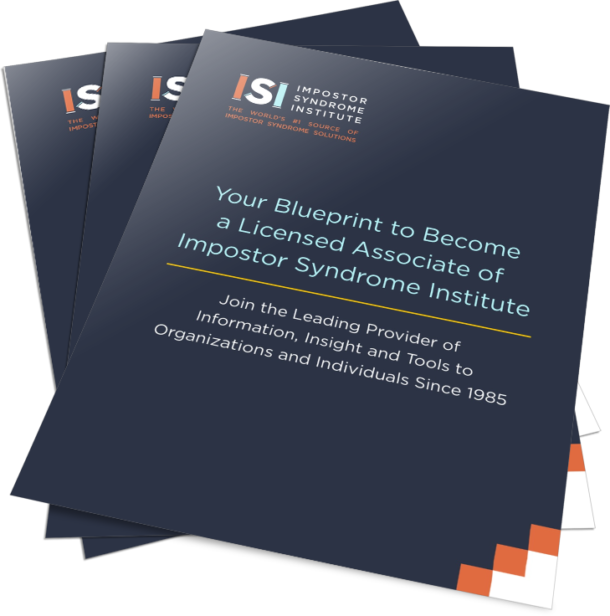Do you dismiss your accomplishments as “no big deal” or “If I can do it, anybody can”?
Do you agonize over even the smallest flaws in your work or beat yourself up when you make a mistake?
Do you feel crushed by even constructive criticism, seeing it as evidence of your “ineptness?” When you do succeed, do you think, “Phew, I fooled ‘em this time but I may not be so lucky next time.”
If so join the club.
What you’ve just seen is the “impostor syndrome” in action.
Despite clear evidence to the contrary, you feel inadequate to do the work you’re fully capable of performing.
Instead you believe they are somehow “fooling” other people into thinking you’re brighter and more capable than you “know” yourself to be.
Deep down you feel like an impostor, fake, and fraud.
The fact is you’re pretty smart. I don’t necessary mean “book smart,” although there’s a good chance that you have at least one degree. In fact you may have two or even three. Some might consider you a high achiever, although it’s unlikely you see yourself that way.
You’re the kind of person who likes to know everything you possibly can about the subject at hand before stepping out there.
After all, you’re not about to risk speaking up in front of others, going after that plum assignment, or selling yourself as some kind of expert unless you’re totally prepared. I’m not talking here about doing your homework. I’m talking about needing to know 150 percent.
And when you do make a mistake you have a really hard time forgiving yourself. After all, in your mind, it’s your failures that really count… so you avoid them at all costs.
Which means you’re probably somewhat of a perfectionist. Not only do you like to get everything just right, but you like to do it right the first time. No first drafts or dry runs for you. You’ve got to nail it right out of the gate. Of course, you also have to make it look easy.
That’s not to say that you’re a stranger to hard work. Just the opposite.
You’re probably prone to over-preparing and you may even be a bit of a workaholic. But when it comes to buckling down to tackle the things that really matter – finishing your thesis, starting the big project, acting on that great business idea – you are a master procrastinator.
After all what if you pour yourself into it only to find out you’re not up to the task? Or, worse, what if you actually manage to pull it off… the more you achieve the more they’ll expect it. And if you don’t know how it you did it the first time, how can you possibly repeat your success?
Sure you’ve done pretty well so far.
Some may even see you as quite accomplished.
But then again you can probably explain all that right?
“The stars were right.” “I got lucky break.” “Right time, right place.”
No wonder you often feel like you’ve managed to somehow fly under the radar screen undetected and it’s just a matter of time before you’re “found out.”
Am I close?
What’s Luck Got to Do, Got to Do With It?
The thing is, to a certain degree your success – and everyone else’s – is a result of some kind of luck.
- It was writer Ray Bradbury’s chance encounter in a bookstore with the British expatriate writer Christopher Isherwood that gave him the opportunity to share his first book with a respected critic.
- Award-winning correspondent and anchor Christine Amanpour found her way into journalism because her younger sister had dropped out of a small journalism college in London. When the headmaster refused to refund the tuition, Christine replied, “Then, I’ll take her place.”
- In what is perhaps the flightiest example of all, mixed-media artist Hope Sandrow made quite a name for herself in the art world doing poultry portraiture. It all began when she went looking for her cat in the woods near her house and happened to find a lost Paduan rooster, the colorful exotic foul prized by 16th century European painters.
When you hear these stories do you think these individuals are any less capable?
Do you now perceive them as less deserving of their success? As frauds? Of course not.
Then why would you think this when serendipity plays a role in your own success?
Not only is luck an element in individual success, it factors into organizational success as well.
So much so that accounting giant Deloitte insists that when it comes to business success, luck is not one factor, it is the central factor. In a 2009 company white paper titled A Random Search for Excellence, they state that the overwhelming majority of success studies claiming to study unexpectedly successful companies “may very well be studying merely lucky companies.”
Looked at more broadly, if you were lucky enough to have grown up in an industrialized nation then you had a better chance of not being born into severe poverty and hence a better shot of achieving financial success as an adult.
Similarly, if you had the good fortune to attend a decent school, or to catch the attention of a great mentor, or to work in an organization who appreciate the benefits of a diverse workplace or to advancing people from within – then lucky you, because your prospects for success just went up considerably.
Indeed the major premise of Malcolm Gladwell’s Outliers: The Story of Success is that many of the world’s most successful people rose on a tide of advantages, “some deserved, some not, some earned, some just plain lucky.”
When Bill Gates was about to enter seventh grade his parents sent him to an elite private school.
Luckily for him the Mothers Club used proceeds from a school rummage sale to buy the students a new-fangled thing known as a computer terminal.
By the time the first PC came along a few years later, Gates was way ahead of the geek pack with thousands of hours of programming experience under his belt.
Anyone can be lucky. It’s what you do with luck that makes the difference.
Keep in mind that Gates’ classmates also had access to this early computer. Notice however that Microsoft® Corporation was not started by the Lakeside class of 1973. It was conceived and built by the person who had the wisdom to work with the advantages presented to him, the initiative to take action, and the perseverance to see it through.
As the American business tycoon Armand Hammer once said, “When I work fourteen hours a day, seven days a week, I get lucky.”
For years I’ve preached that successful people really are “luckier” – however, not totally due to serendipity.
Rather successful people routinely put themselves in more situations where good things are likely to happen.
They show up in places where they’re apt to meet interesting people.
They are lifelong learners who frequently attend classes, symposiums, and conferences.
They set goals and follow through with deliberate action.
Successful people are also intensely curious.
They talk to strangers seated next to them on an airplane, at their kid’s sporting event, standing in line for tickets, or working behind the counter of their local cafe. And because learning is so important to them, they ask lots of questions.
These are all things that less successful people rarely do.
But because successful people do them, it effectively positions them to attract good fortune in the way of contacts, advice, assistance, and collaborators.
Of her own rise to fame, Good Morning America anchor Robin Roberts wrote, “I learned how to put myself in a position for good things to happen to me. Even when I felt outnumbered or afraid, I made sure I was ready to grab the ball when it came my way.”
On the flip side, there’s a danger in viewing success solely in terms of luck.
You see someone who is living your dream of writing children’s books, being a motivational speaker, or hosting her own radio show and you think, “She’s so lucky.” But what you really mean is, “Sure that happened for her, but it will never happen for me.”
And in this case you’re probably right.
Not because you are inherently unlucky. But because when you frame success as totally the luck of the draw, like the lottery, your chances of achieving it are one in millions.
As Earl Nightingale said, “Success is simply a matter of luck. Ask any failure.”





